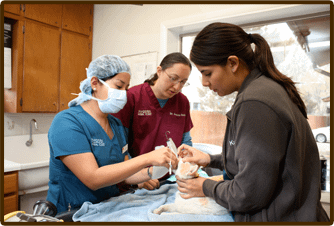Caring For Your Senior Cat
Preventative care is the most important component of health care in all stages of life. You can help extend your pet's healthy years and quality of life by providing nutritional support, keeping vaccinations current, scheduling routine wellness examinations every 6 months, and providing regular dental care. Since older animals have a higher incidence of such conditions as heart disease, diabetes, thyroid problems, major organ failure, benign and malignant tumors, and arthritis, early diagnostic testing to help detect these unseen conditions is an important part of the Senior Care Wellness Program.

How Old is “Old”?
For practical purposes, we consider cats over the age of 8 to be "seniors." Many variables affect aging including genetics, nutrition, and environmental influences. In reality, old age is not just a chronologic measurement of years lived, rather it is a measurement of the function of body systems subsequent to the effects of aging. There are a number of ways you can "slow the clock" and promote a long healthy life.
Dietary Considerations
Proper nutrition can help prolong the life of your pet. There are several premium cat food companies (Science Diet, Iams, Purina) that have designed a diet specifically for older, less active cats. These diets include antioxidants to help slow the effects of aging, glucosamine and chondrointin to help support healthy joints and cartilage, reduced calories to aid in weight management, and highly digestible carbohydrates to promote a healthy digestive process. You should provide plenty of fresh water and weigh your cat every 60 days on the same scale, recording their weight.
Dental Care
Most pets need professional dental cleaning once a year. Periodontal disease is the most common infectious disease in cats, and seniors are especially susceptible. The problem begins when plaque and tartar accumulate on teeth, harboring bacteria that can infect gums and roots. If left unchecked, chronic infection of the oral cavity can spread bacteria to the bloodstream and infect major organs such as the heart, kidneys, liver, and lungs. A professional dental cleaning is the only method to restore dental health and alleviate pain.
Diagnostic Testing
Four basic tests are used to help diagnose the health of your pet. These tests can help identify early-stage disease when control or even prevention is possible (and most cost-effective).
- Complete Blood Count (CBC): Evaluates the number and type of blood cells in circulation. This helps to determine the body's ability to fight infection and to carry oxygen to the tissues.
- Chemistry Test: Evaluates the functions and health of the liver, kidneys, and pancreas.
- Thyroid Function Test: Useful in diagnosing increased (hyper) or decreased (hypo) functions of the thyroid gland.
- Urinalysis: Helps in early detection of kidney disease. Assesses the health and function of the urinary system.

